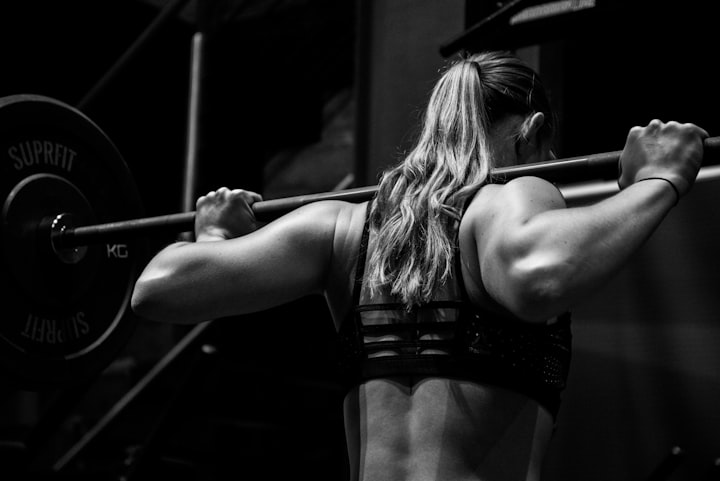The Citizen, the Challenger, and the Fighter
Part 3: Are Fighters "The Best"? The Relationship Between the Challenger and the Fighter. And: is it possible to be "Part-Challenger" or "Part-Fighter"?

Would it be better if we were all Fighters?
If you mean “if we were all Fighters in the Fitness Society,” my answer is, "maybe, on some level," but it is not possible. Why? Not because the vast majority of people are “weak,” but because the world requires more than Fighters in the Fitness Society in order to function. It requires Fighters in numerous societies: the Societies of politics, hearth and home, business, advocacy, innovation. If society were made up of nothing but elite-level bodybuilders, powerlifters, weightlifters, track and field athletes, wrestlers, and ballers of all sorts, 9/10th of society would cease to function. There would not be adequate structure for all of these athletes to compete; and what’s more, there would be such a broad pool of talent to choose from....the task of winning glory by being the best would become incalculably harder, if not impossible.
Perhaps if that were the case, glory would no longer be won by being “the best,” but by some other thing. But that is a hypothetical for another day.
For now, be content that there are three groups in the Fitness Society for the Novice to aspire to, and especially if you already belong to one of them.
However, if you mean “would it be better if we were all Fighters in general?” I would have to say, yes, because it would mean that the people who organized society were driven by the desire to obtain the highest degree of performance from everyone, to secure all of the freedom to excel and improve that they had for everyone else, to be encouragers and to do away with insecurity and fear altogether so that everyone who wants to can achieve their maximum possible potential as a society of Fighters.
That is not what we have now, but maybe someday, once we get rid of the career Negative Novices who believe that “there have to be losers in order for there to be winners.” They only say this out of fear: of not being all that special and unique, after all.
More Thoughts on the Relationship Between the Challenger and the Fighter
The Challenger rebels against complacency. Rather than simple Freedoms that someone else defines, the Challenger seeks to define their own Freedoms through the pursuit of Challenges. A Challenge is like a heist, requiring planning, focus, determination, and even a little fear, for the promise of a greater sense of accomplishment and ability, plus the local notoriety of having been the one to achieve it. And more difficult Challenges bring greater rewards.
Some of us live as a Challenger but feel we have the “soul” of the Fighter, which may be true. Perhaps the conditions and circumstances of one person’s life predispose them to being a Fighter more than the circumstances of someone else’s life. Perhaps, then, that “soul” reveals itself in small ways, and were it to be followed wholly, exclusively, unquestioningly—perhaps upon finding itself in the right circumstances, and/or having the proper guidance—a true new Fighter may come into existence.
But the Challenger who would be a Fighter must ask themselves, “why am I not a Fighter?” And the answer is simple: because Challenges pose no real risk. They are chosen by the Challenger themselves, as is their criteria of success. Challenges are arbitrary and specific. The Fighter does not seek to excel in one or two random, unrelated fields; rather, she fights against any chance of failure, any slight shred of underachievement in any area of her fitness life.
For the Challenger to become a Fighter, then, she would simply start working, wholeheartedly and without question, to remove any possibility of being anything less than her 100% best. That means she would remove all distractions, all excuses, all delusions. She would choose a field of Battle—a sport or activity like swimming, bodybuilding, powerlifting, or basketball—and stick to it. (Perhaps she would not actually enter a league and compete, but she would allow the standards of that sport and its professional realm to inform her own ideas of greatness and success).
In other words, her definitions of progress and success are no longer self-generated, but originate from some outside authority.
She would humble herself to within an inch of her ego’s life, and then build herself back up to the fullest fruition of her human potential. They would, for the most part, deny any feeling, thought, habit, or sensation that does not propel them towards a greater level of readiness for Battle.
Most humans do not live like this, and do not need to do this. For most people, fitness should improve their lives; not define them. Most humans are complex, multifaceted, and sensuous, and while they may live under countless authority figures, very few of these figures are submitted to entirely voluntarily. Hence, they may resent authority without even realizing it.
Though these humans may not live up to their fullest “potential” in many fields, or perhaps even in one, the winningest of Citizens experiences life as a series or sequence of experiences, sensations, and ideas. “Living life to the fullest,” and the variety that living this way entails, becomes the activity or purpose in which they attempt to reach their full potential, not any one single endeavor or group of endeavors. It is a way of life that Challengers may deride, and Fighters resist.
But unlike a Challenger, a Fighter does not let envy impede their progress. They reduce neither their expectations nor their standards. They merely listen to the words of their chosen authority figures—their coaches, trainers, psychologists, doctors, mentors, advocates, sport rulebooks, and their own heart—and win glory, if not on the stage, then of the heart.
The difficulty in moving from Challenger to Fighter also derives from the fact that both person's goals derive from external factors. Many Challengers actually choose Challenges that are very much in line with the mainstream of the Fitness Society: heavier lifts, faster runs, bigger muscles, et cetera.
But sometimes they view themselves as superior to Citizens and are often resentful of Fighters. This potentially warped sense of self (the "dark side of the Challenger" as described above) informs our understanding of the relationship between Challengers and Fighters and the degree to which a Challenger is capable of becoming a Fighter.
The difficulty in moving from Challenger to Fighter largely derives from the fact that both person's goals are externally determined, not self-determined. The difference is that the Challenger often believes, mistakenly, that her Challenges are self-generated: that they are completely original, and come from nowhere besides her own mind.
Following this line of logic, it is not "society" that tells her that bigger, heavier lifts are better, or that bigger, rounder muscles or curves are more desirable. In her mind, it is not external validation that she seeks; she is, instead, an island of self-awareness, original genius, and objective distance.
And yet, the Challenger resents or envies the Fighter and scorns the Citizen, while feelings of inadequacy haunt her like recurring nightmares. Why?
As described earlier, the Challenger is driven by ego, while the Fighter is driven by the desire to be free of the ego. The Challenger sees the ego as the ultimate driver of progress, while the Fighter sees it as the ultimate hindrance to fulfilling her true potential.
Regardless of who is "right," the egoistic tendencies of the Challenger compel her to pursue Challenges are, in fact, intended to satisfy or impress other people besides herself. This tendency, as human as human can be, illustrates a lack of the kind of sober self-reflection required to know what she really wants and what she is willing to accomplish it, even if that means losing her ego, losing loyalties, losing friends, losing admiration and even respect from people whose good opinion she once keenly sought.
This road—cold and dark and seemingly alone, but filled with promises beyond her wildest daydream—is the road of the Fighter, and it takes a certain kind of crazy to walk it.
Can a person be “Part-Challenger” or “Part-Fighter”?
It’s important to recognize that the spirit of each group lies within each individual. I will state that differently: each of us possesses the spirit of the Citizen, the Challenger, and the Fighter within us.
Certainly, some individuals are better-equipped physically to participate in one group or another. Some are at a more appropriate age or stage in life to entertain dreams of Fighterly success on the Battlefield.
However, it is possible to exhibit the essential qualities of the Novice, the Citizen, the Challenger, or even the Fighter, without truly “being” one or the other.
It falls to one’s ability to access each spirit. Accessing the spirit of the Citizen relies on believing in fitness’s ability to improve one’s life even if it does involve some elements of discomfort or hardship. It also relies on a desire to enjoy life, since the Citizen views fitness more as a means by which to further enjoy life, and less as an end unto itself.
The spirit of the Challenger is more evasive, since it requires seeing oneself as both competent at and passionate about a specific activity, and the discomfort that it represents no longer plays a significant role or any role. In fact, the discomfort may even be enjoyable. In contrast to the Citizen, fitness itself is part of the Challenger’s life, and it is enjoyed as a means to itself.
The spirit of the Fighter is more elusive still. On one level, it requires the most ambition, the most haughtiness, arrogance, pretense, audacity. It takes a willingness to stand apart and alone and to dedicate oneself to fitness or sport as a lifestyle that Challengers view more as a hobby and Citizens view closer to an obligation. The Fighter seeks the greatest reward and in so doing, takes the greatest risk. And what’s more, no one succeeded as a Fighter if part of them didn’t believe that they were born a Fighter.
That’s what separates the Citizen, the Challenger, and the Fighter the most: the level of self-belief required to succeed.
And anyone, if they are in the correct mindset and have worked to earn the right, can aspire to harnessing the spirit of the Fighter that lives inside them and achieving the greatest goals possible for themselves, right now, at this exact moment in their complex, swirling, uncertain lives.
Human beings are incalculably strong: to have survived for so many thousands of years, to have suffered unbelievable cruelties, injustices, and natural disasters, to have pushed forward towards progress and procreation of our species despite the utter barbarity of our collective past, and present. Even getting through a single day in spite of all of the potential reasons to give up—an unjust society, a corrupt body politic, and the perceptible prevalence of ignorance, misanthropy, and ingratitude—is a miraculous and courageous act, in my opinion.
The thing is, all of these hardships are externally imposed. The ability to change from a Novice to a Citizen, from a Citizen to a Challenger, and from a Challenger to a Fighter, or to be part-Challenger or part-Fighter—not just in the Fitness Society but within life itself—is based on your ability to choose your own hardships, your own Challenges—whether externally or internally derived; that doesn't actually matter—your own Battles, and to Fight for them because you believe in them. You believe in their value, in the hope that they give you, and in their ability to make you a better person.
By extension, you believe in their ability to build a better world through you, a world where all humans can freely choose the majority of the hardships in their lives, unencumbered by fear, alienation, or disbelief in their own strength.
End of Part Three of Three. Thank you for reading.
Learn more about the author—a NASM-certified personal trainer and business owner—at www.resistancequest.com
About the Creator
Resistance Quest Fitness
A Fitness Company.
Home of the Paralinear Method, Return on Fitness™, and STACHKA Garage Gym.
Embrace Your Power.
www.resistancequest.com
www.paralinear.com






Comments
There are no comments for this story
Be the first to respond and start the conversation.